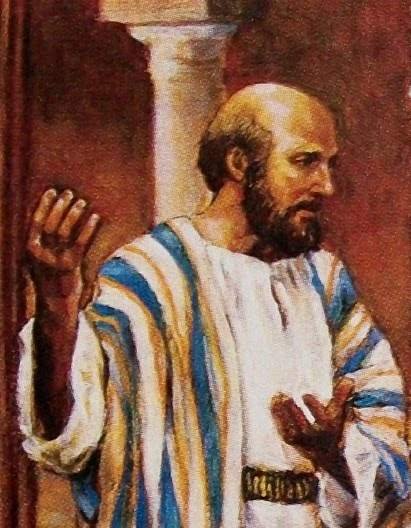The first and only time I ever had a formal Sunday school lesson curriculum was in my seventh grade Sunday school. For two semesters, we were taught about the journeys and epistles of the Apostle Paul (the first time I learned the word “epistle”). We had a small, intimate group of boys, a nurturing teacher, and truly instructive and edifying lessons — perhaps the only formal Bible instruction I ever received. I do not remember our teacher’s name; only that he was a good man and a good teacher, a leader with the Royal Rangers (the Assemblies of God’s answer to Boy Scouts). He looked an awful lot like the image of Paul on the cover of our lesson booklets — short and bald with a beard and moustache — so to me he will always be Paul. (I will have to inquire about his name; I would like to know.)
I remember being fascinated with the historical Paul and his times. It was the first time I had ever truly conceived of a biblical character as a true, flesh and blood person, or of biblical times in the context of history. This was the same year that I first became enthralled with ancient history in Mr. Reece’s Social Studies class (may he rest in God’s mercy). I remember the maps of Paul’s missionary journeys; I have always loved maps. Every Bible I’ve ever had has included maps of Paul’s three missionary journeys, but I distinctly remember there being a fourth one. Perhaps it was his journey to Rome, as few evangelicals seem to acknowledge anything that took place outside the certainty of Scripture; but I do recall this map taking him to western Europe and to Spain, as he had hoped (Romans 15:24). My ESV Study Bible notes that there is “some historical evidence” that Paul did preach in Spain — among the Church Fathers? This mystery has compelled me for years.
(An aside: Another memory, another song, that’s always dwelt on the edges of my memory, from the Christian conference in Richmond we used to attend when I was a child: In our daytime class, they taught us a song about the twelve disciples. All these years I’ve been trying to remember that song, every time I’ve tried to recall the twelve Apostles — but all I could remember was the last one, “and Bartholomew.” For that reason, Bartholomew has always had a special place in my heart, as the “last one picked.” Anyway, recalling vaguely the tune, “and Bartholomew,” I set out to find that song tonight — and I found it! To the tune of “Bringing in the Sheaves.”)
I remember the first time I ever heard of the Roman Catholic Church — some outlandish rumor from a friend, when I was ten or so, that Roman Catholics drank wine and worshiped naked. Perhaps he had it confused with some pagan ritual?
The next harbinger — the first clear indication that I was longing for the roots of my faith — appeared when I was sixteen or so. At Calvary in those days, we had a zealous, emotional youth pastor named Pastor Pat, who encouraged us to be “on fire” for God. In many ways this was a painful time for me; it was even more painful in its coming to an end. So it is ironic — no, it is the work of God’s hand, bringing all the pieces together — that an experience that came so close to driving me away from God completely should be so instrumental in my discovering my true path so many years later.
A number of Pastor Pat’s sermons left a mark on me — some ridiculous, others thoughtful but overblown — but there was one in particular that I will never forget. Pastor Pat had somehow gotten a hold of a book other than the Bible, Foxe’s Book of Martyrs (which he declared to be “the closest thing to inspired literature other than the Bible”), and he passionately preached the martyrdom of St. Peter, crucified upside down because he felt unworthy to die in the same manner as his Lord, and of St. Polycarp, burned at the stake but miraculously spared from the flames, until pierced by the sword.
The vivid pictures Pastor Pat painted of these early heroes of faith captured my imagination. Very soon after that, I ventured to the library (I was driving by this time) and checked out a book on the fates of the Apostles after the New Testament. For the first time, I conceived that our Church had a history after the New Testament but before us. I also around this time began to wonder about the New Testament itself, and discovered the New Testament apocrypha. I was deeply fascinated, and more than a little disturbed, that there were writings that the early Church had rejected. I checked out several books of apocryphal writings. I did not study them deeply, but read enough to convince myself that there was a reason they were rejected, and that we have the New Testament we are supposed to have. This was perhaps the early stages of the real period of questioning my faith that I entered my senior year. Reason, with regard to my faith, was awakening.


